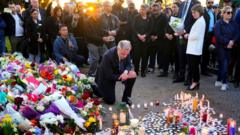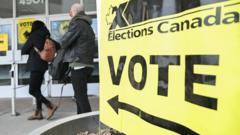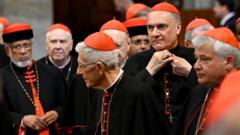Canadians face a pivotal electoral moment as they weigh their future leadership amidst economic upheaval sparked by President Trump. The Liberal Party, led by Mark Carney, is in a close contest with the Conservative Party under Pierre Poilievre, with voter sentiments shifting dramatically in recent months.
Crisis at the Ballot: Canada’s Election Hangs in the Balance Amidst Trump’s Shadows

Crisis at the Ballot: Canada’s Election Hangs in the Balance Amidst Trump’s Shadows
With voters heading to polls, the Canadian election proves contentious as Mark Carney's Liberals attempt to fend off Pierre Poilievre’s Conservatives in a turbulent economic environment influenced by President Trump.
Canadians are preparing to make a crucial decision as the nation heads to the polls today in a significant election shaped by international tensions and domestic challenges. The vote will determine the next Prime Minister and set the course for the country's response to President Trump's trade threats amidst growing economic uncertainty.
Recent opinion polls indicate a closely matched contest between the incumbent Liberal Party, guided by Mark Carney, and the Conservative Party, led by Pierre Poilievre. Just months prior, the Conservatives held a commanding lead of over 25 percentage points, positioning Poilievre as the presumptive next Prime Minister. However, a series of events have dramatically altered the political landscape, including the resignation of Justin Trudeau and Trump's aggressive tariff measures, which have revitalized Liberal support.
With a roster of five parties contesting for the 343 seats in Canada's House of Commons, the electorate is confronted with various political visions. Alongside Carney and Poilievre, the New Democrats, the Greens, and the Bloc Québécois also vie for influence, though the latter three are expected to secure only limited representation.
Carney, recently appointed Prime Minister in March and a former central banker, has marketed himself as a bulwark against Trump’s economic maneuvers, specifically highlighting his finance background as beneficial for stabilizing the economy amid tariffs and threats. Poilievre, conversely, has advocated for reduced federal intervention and espouses a more confrontational stance towards what he perceives as "woke ideology;" however, his close ideological ties to Trump have alienated segments of the electorate concerned about Canada's sovereignty.
Polls are staggered across Canada to facilitate the counting process, with most closing by 9:30 PM ET. This election is anticipated to be a barometer of the public’s mood towards current governance, with many Canadians expressing dissatisfaction over rising costs of living and an escalating housing crisis, which have taken center stage in campaign discussions.
Amidst the electoral fervor, Trump's influence looms large, with declarations suggesting Canada could join the U.S. as its 51st state. His recent remarks have drawn sharp rebuttals from both Carney and Poilievre, emphasizing Canadian sovereignty and independence in the face of external pressures.
As voting unfolds, citizens will not only be determining their leadership but also signalling their collective response to an increasingly complex and volatile geopolitical landscape. With potentially profound implications ahead, the outcome of today’s elections could reshape the fabric of Canadian politics and its global relationships.
As the vote unfolds, Canadians remain vigilant, weighing their choices at this critical intersection of national identity and economic resilience. Results are expected late tonight, providing insight into the future direction of Canada amidst a changing political tide.






















